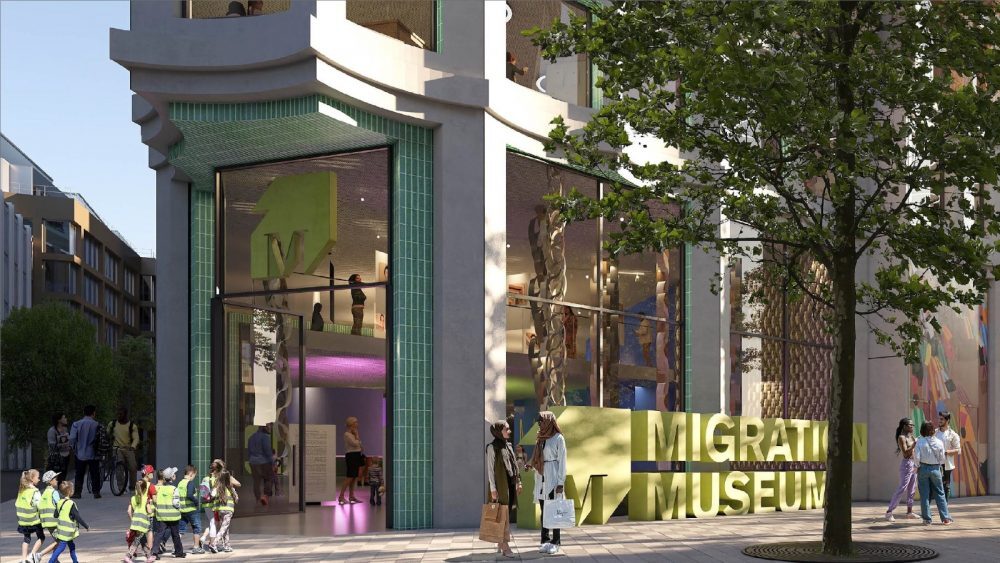
Written by Christopher Johnson, Head of the Editorial Team of the Young People Advisory Board
Southeast Londoners hustle and bustle in Lewisham Shopping Centre for meals and shopping on days out with family and friends.Yet, the leisure centre is the unlikely home for a museum that tells the tale of how and why London is one of the most diverse cities on the planet.
The Migration Museum takes you on a journey that looks at the establishment of various migrant communities in Britain’s capital. From the barber shops that are an essential meeting spot for African-Caribbean men, to Indian restaurants whose culinary influence altered Britain’s pallet, the museum delves into how immigrants have made the UK what it is today.
“Everybody has a connection to the theme of migration. For some people it is further back in their families. For others, it is through their love choices. We are here to explore migration as a universalizing theme rather than one that divides.” Emily Miller, Director of Learning and Partnerships at The Migration Museum, told the Young People’s Advisory Board.
“The politics of migration in this country are nasty. They seek to divide, to sow division, suspicion and fear. We are trying to create a space where that can be explored in a safe space that helps everybody,” she added.
The rise of Nigel Farage and the UK Independent Party (UKIP) set the tone for the immigration debate in the UK. The success of the Brexit campaign was built on convincing many within the British public that immigration and issues with the EU were intertwined.
However, since the vote to leave the European Bloc in 2016 discourse around immigration has become increasingly toxic. The UK government is enacting a policy to give asylum seekers who cross the channel from France a one-way ticket to Rwanda forcing them to settle in the East-African nation rather than the UK.
The Conservative government’s hard-line stance against immigration has caused public uproar and spats with celebrity figures like Gary Lineker, who accused the government’s recent Illegal Migration Bill, of using language ‘not dissimilar to that used by Germany in the 30s.’
Cym Henry, the Education Assistant at the Migration Museum, is concerned by the actions of the British government against migrants:
“There is a greater need for respite around times like this as well, when there are headlines that make you feel like things are openly hostile. When our politicians are not even camouflaging hostility, it feels quite scary,” he said.
“There is a real need told to us by people who visit, they say: ‘I can take a breath here.’ It’s a breath of representation, of belonging, of having a space to think on your identity, in a place where you are not being constantly questioned.”
The museum was founded almost 20 years ago by Barbara Roche, a former British labour politician, believing that Britain’s history of migration should become central to the country’s history.
From 2013 and 2017, the Migration Museum held pop-up exhibitions and events around the UK. It then found a temporary home in a former London Fire Brigade workshop in Lambeth, London from 2017 to 2019. It then moved to Lewisham Shopping Centre in 2020, but the museum will move one last time to a permanent home in the City of London for the year 2025 or 2026.
“The theme of migration is never neutral, it is always political with a small p. But we have been careful to seek support across the political spectrum. Our Chief Executive Officer Sophie Henderson has been careful to approach members of the House of Lords, former ministers and former MPs from every major political party,” Miller said.
“To really say that this goes beyond party politics, migration is part of our history, it is part of our contemporary culture, where we are now, and inevitably where we will be in the future. And that is not about whether you are a Tory or a Labour voter, it’s about what connects us all.”
The Migration Museum brought to light how intertwined the movement of people is to Britain’s story. Despite political discourse against migration, every person in British society has been touched by the legacy of migration.
Being honest about this and embracing our differences rather than tolerating them will lead to the UK being more comfortable and confident in its multicultural identity.
